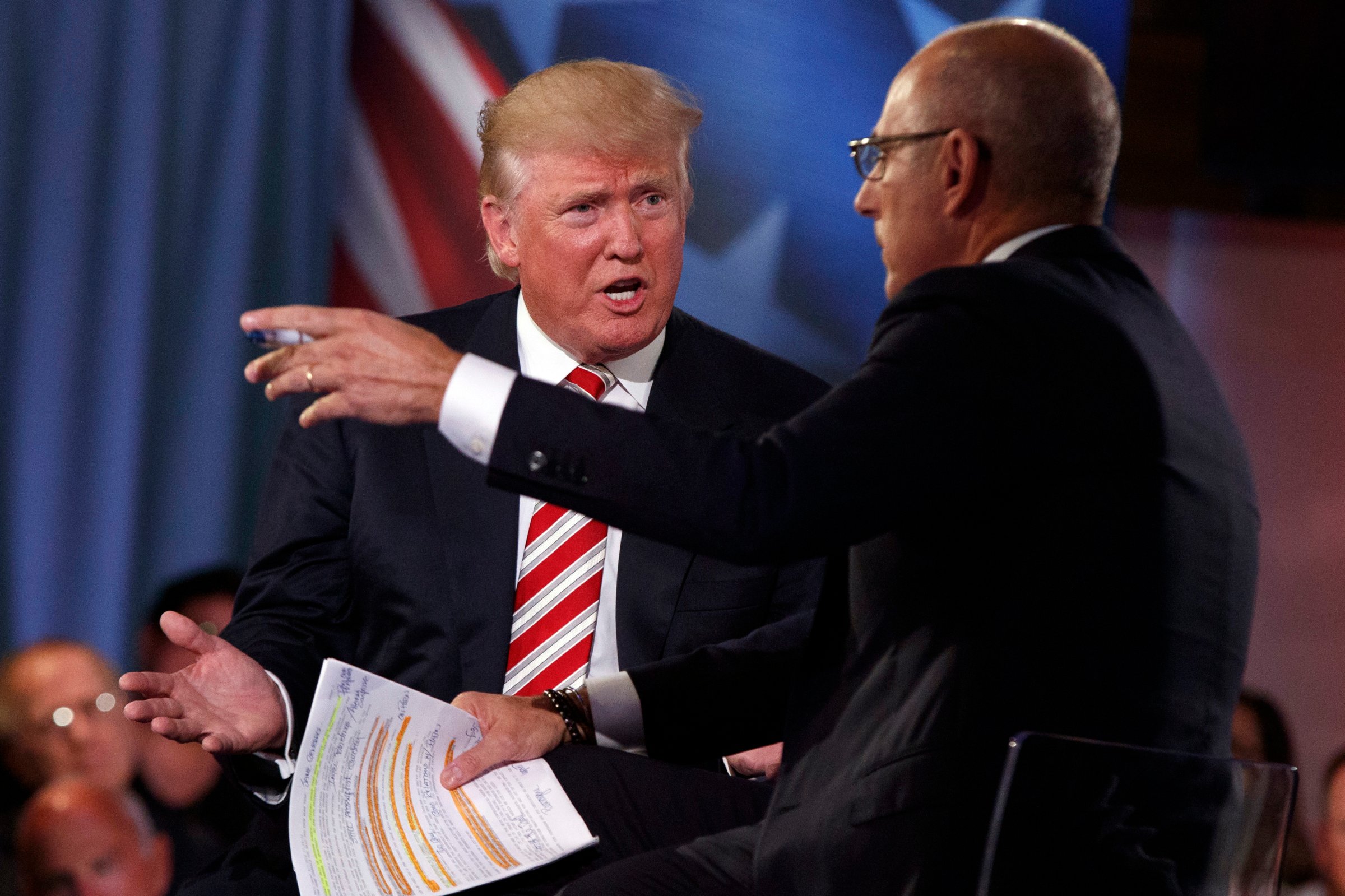
When Hillary Clinton and Donald Trump faced off at forum on national-security issues in New York City on Wednesday night, host Matt Lauer pressed the Republican presidential nominee on the contents of two classified national security briefings he had received so far.
Asked whether he had learned anything from the briefings, Trump said that “President Obama and Hillary Clinton and John Kerry, who is another total disaster, did exactly the opposite” of what the experts recommended. Following those comments, Clinton called it “totally inappropriate and undisciplined” for Trump to have commented in such a manner on the classified meetings.
This not the first time an intelligence briefing has caused an uproar during the 2016 campaign—in July, Senate Minority Leader Harry Reid suggested that Trump ought to get “fake” briefings—but such controversies are a deep part of the history of those briefings.
The custom dates back to the 1952 election and it wasn’t meant to become such a political hot potato. As TIME recently reported, when President Harry S. Truman proposed inviting the nominees — former Illinois Gov. Adlai Stevenson and former commander of the Allied Forces Gen. Dwight D. Eisenhower — to lunch at the White House with the Cabinet and a briefing by intelligence officials, he was just trying to make sure the next commander-in-chief wouldn’t come to office as clueless as he had been when President Franklin D. Roosevelt died on April 12, 1945. He told reporters that catching up on the Manhattan Project and the development of the atomic bomb “felt like the moon, the stars, and all the planets had fallen on me.”
Get your history fix in one place: sign up for the weekly TIME History newsletter
As TIME reported in Aug. 25, 1952, Democratic nominee Stevenson’s first briefing consisted of a 20-minute rundown on the Korean War with C.I.A. Director General Walter Bedell Smith and General of the Army Omar Bradley, chairman of the Joint Chiefs of Staff. But TIME also reported that Stevenson received campaign advice from Truman. Because Stevenson got the first meeting, Eisenhower claimed that looked like the President was trying to influence the election. He said so in public and in a letter to Smith, who happened to be his former chief of staff. According to the TIME article, Bradley attempted to take the hit, arguing “since Ike was so well informed on the international situation, neither Bradley nor Defense Secretary Lovett had seen any need to make immediate arrangements with Eisenhower” and apologized, claiming “it never occurred to me that the timing of notification might become an issue.”
But once invited, Eisenhower declined, writing to the President that he did not feel it would be appropriate to attend:
In my current position as standard bearer of the Republican Party and of other Americans who want to bring about a change in the National Government, it is my duty to remain free to analyze publicly the policies and acts of the present administration whenever it appears to me to be proper and in the country’s interests.
During the present period the people are deciding our country’s leadership for the next four years. The decision rests between the Republican nominee and the candidate you and your Cabinet are supporting and with whom you conferred before sending your message. In such circumstances and in such a period I believe our communications should be only those which are known to all the American people. Consequently I think it would be unwise and result in confusion in the public mind if I were to attend the meeting in the White House to which you have invited me.
As you know, the problems which you suggest for discussion are those with which I have lived for many years. In spite of this I would instantly change this decision in the event there should arise a grave emergency. There is nothing in your message to indicate that this is presently the case.
An offended Truman wrote the general in a letter dated Aug. 16, 1952, “Partisan politics should stop at the boundaries of the United States. I am extremely sorry that you have allowed a bunch of screwballs to come between us.” (Some scholars say tensions between the once friendly Eisenhower and Truman during the 1952 campaign at one point had to do with Truman being appalled that Eisenhower didn’t properly defend, on the campaign trail, his own mentor former Secretary of State George Marshall — whom Truman admired as well — against “attacks by Senator Joseph McCarthy”.)
Eisenhower eventually did accept the offer of weekly CIA reports, according to John L. Helgerson‘s Getting To Know the President: CIA Briefings of Presidential Candidates 1952-1992. Each candidate got at least few briefings before Election Day in November — Eisenhower even received one at a rodeo in Denver — but it may not have made much of a difference.
In his memoirs, the election’s victor Eisenhower described the briefings as very “general” and adding “little to my knowledge.”
More Must-Reads From TIME
- The 100 Most Influential People of 2024
- The Revolution of Yulia Navalnaya
- 6 Compliments That Land Every Time
- What's the Deal With the Bitcoin Halving?
- If You're Dating Right Now , You're Brave: Column
- The AI That Could Heal a Divided Internet
- Fallout Is a Brilliant Model for the Future of Video Game Adaptations
- Want Weekly Recs on What to Watch, Read, and More? Sign Up for Worth Your Time
Write to Olivia B. Waxman at olivia.waxman@time.com